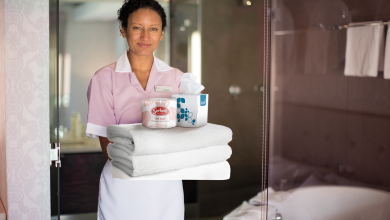Down To The Basics
When it comes to green cleaning it’s really just a set of simple choices – adopting habits and using products that are going to have a positive impact on the environment.
Sales of natural cleaning products have surged in the past few years as we become more aware of the dangers of harsh chemicals, not only to the environment but to our health too. And the “environment” refers not only to our external environment such as land, waterways and air, it’s our internal environment too – our homes, our offices, our hotels and motels.
These concerns have prompted many consumers to push for safer alternatives to cleaning products. But identifying environmentally safe cleaners can be challenging for consumers.
In 2010 an environmental consulting firm TerraChoice Group produced a report called The Sins of Greenwashing. In it the group found more than 95% of so-called green consumer products had committed at least one “greenwashing sin” like making an environmental claim that may be truthful but unimportant.
What does “non-toxic”, “natural” and “biodegradable” mean and if something is non-toxic, biodegradable or natural, does it mean that it’s safe? If you want to choose a product that is friendly to you and the environment, it’s important to know what these words actually mean.
Simply put “biodegradable” refers to how readily something is decomposed in the environment. There is a standardised test that is used to determine whether or not a chemical is biodegradable. However, biodegradability really has little to do with whether or not something is toxic. Just because something breaks down quickly in the environment does not necessarily mean that it is not toxic to the external environment or a safer option to use in our homes or businesses.
“Natural” means that it’s not artificial or manufactured. It has little or nothing to do with whether or not something is toxic. There are many things that are natural that are very toxic, like cyanide and arsenic that are found in some fruit seeds. Natural also has nothing to do with whether or not something is biodegradable. Metals are all found in nature and none of these are very biodegradable. However “natural”, when it comes to things like cleaning chemicals, can offer you information as to what the ingredients are derived from and whether or not they could be harmful to you or the environment. When ingredients are listed, choose products made with plant-based, instead of petroleum-based, ingredients.
“Non-toxic” is a bit of a misnomer. Just about everything can be toxic if you eat, drink, absorb or breathe enough of it. However, with some chemicals, the amount it would take to harm you is so great that it is essentially non-toxic. Therefore, if you’re looking for something that is less harmful to you, you’ll want something that says that it is non-toxic. There is a caveat here, however. Just because something is non-toxic to humans does not mean that it is non-toxic to other creatures. The multi-purpose cleaner that you might be able to drink without any real effect might kill the fish in the stream.
Even if a cleaning product proclaims itself “green”, “natural” or “biodegradable” that doesn’t necessarily mean its better for the environment.
Let’s look at D-Limonene, commonly known as orange oil. Its natural (derived from orange peel) and biodegradable. Is it safe to use? How green is it? Is it non toxic? Orange oil is a known sensitiser and can trigger respiratory distress when the vapours are inhaled by some sensitive individuals. It is classed by the NOHSC as an eye and skin irritant. It can also be toxic to aquatic organisms and may cause long term adverse effects in the aquatic environment. In Europe, products containing D-Limonene are classified as marine pollutants and carry a symbol of a dead tree and a dead fish to identify its environmental toxicity. And these European labelling regulations will be adopted in Australia in the future.
Our external environment is not the only thing that can fall victim to cleaning products’ acrid ingredients. Traditional cleaners often contain harsh chemicals that can be harmful to our health too. Health effects associated with some cleaning products include cancers, hormone disruption, asthma, contact dermatitis, burns to the skin and eyes and inflammation or fluid in the lungs.
No one can avoid exposure to chemicals altogether but it is possible to reduce it significantly by limiting the amount of exposure to chemicals and avoiding the nasties. Green cleaning is good but green cleaning and safe is even better. Here are some of the worst toxic offenders commonly found in traditional cleaning products:
Ammonia: A common ingredient in window cleaners and a powerful irritant that can also create a poisonous gas if it’s mixed with bleach.
Chlorine-bleach: Found in many traditional bathroom cleaners, scouring powders, toilet bowl cleaners, mildew removers and laundry whiteners. The health risks from chlorine can be acute, and they can be chronic; it’s a respiratory irritant at an acute level.
Sodium hydroxide: Found in oven cleaners and extremely corrosive. If it touches your skin or gets in your eyes, it can cause severe burns. Routes of exposure are skin contact and inhalation. Inhaling sodium hydroxide can cause a sore throat that lasts for days.
Volatile organic compounds: Some cleaning products may contain dangerous ingredients such as organic solvents and petroleum-based chemicals which can release VOCs making indoor air toxic. These contaminants may persist indoors long after using a product.
Phosphates: These are naturally occurring minerals used in automatic dishwashing detergents as a water softener. When released back into the environment, phosphates can cause algae blooms in lakes and ponds that kill aquatic life. Look for phosphate-free dishwashing detergents.
Being green is easier once you know what you are looking out for. For your hotel, resort or motel, going green means a more comfortable place for your employees to work and for your guests to stay. For the environment it means improved air and water quality, reduced solid waste and natural resource conversation.
When considering the purchase of green cleaning products, choose those that are packaged responsibly. Consciously purchasing biodegradable and natural cleaning products will help minimize the impact of hazardous chemicals on health and the environment. Don’t forget that motels/hotels that go green in their cleaning operations will have a much larger effect than a single household moving to green cleaning.
Marslie Smits
RubbedIn

AccomNews is not affiliated with any government agency, body or political party. We are an independently owned, family-operated magazine.







